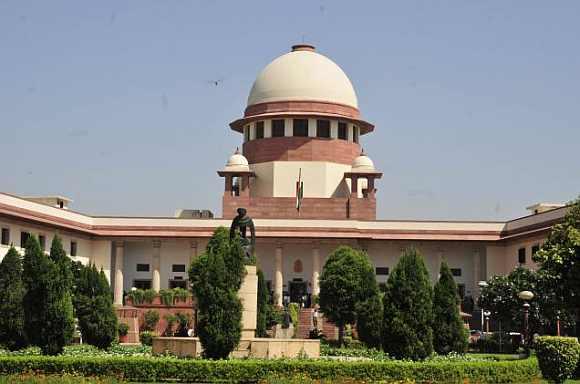In a huge setback to the Akali Dal government in poll-bound Punjab, Supreme Court has thwarted its attempt to wriggle out of the Sutlej-Yamuna Link canal water sharing pact, saying it cannot "unilaterally" terminate it or legislate to "nullify" the verdict of the highest court.

The Apex court responded in "negative" to all the four questions referred to it for the opinion by then President A P J Abdul Kalam on the constitutional validity of the law passed by then Punjab government-led by Captain Amrinder Singh to nullify the court verdicts and unilaterally terminating the almost three-dacade old SYL water sharing agreement.
"Once a conclusion is arrived at to the effect that one state, which is a party to the litigation or an Agreement, cannot unilaterally terminate the Agreement or nullify the decree of the highest Court of the country, the state of Punjab cannot discharge itself from its obligation which arises from the judgment and decree dated January, 15, 2002 and the judgment and order dated 4th January, 2004 of the apex court," a five-judge Constitution bench headed by Justice A R Dave said in its advisory verdict.
The Apex court had first decreed the suit of Haryana in 2002 asking Punjab to honour its commitments with regard to water sharing in the case.
Punjab challenged the verdict by filing an original suit which was rejected in 2004 by the Supreme Court which asked the Centre to take over the remaining infrastructural work of the SYL canal project.
Taking strong note of defiance in not complying with its two earlier verdicts in the case, a bench, which also comprised Justices P C Ghose, Shiva Kirti Singh, Adarsh Kumar Goel and Amitava Roy, said there was legal sanction to the water pact agreed to between the two states of Punjab and Haryana on December 31, 1981.
The decree of the apex court gave legal sanction to the agreement in question.
"There is thus a legal sanction to the said arrangement and once a binding decree has been passed by a Court of Law, a party to the litigation cannot unilaterally act in a manner which would nullify the effect of the decree," the bench said.
The controversial 1981 water sharing agreement came into being after Haryana was carved out of Punjab in 1966.
The Indus Water Treaty, 1960 which was executed between India and Pakistan, later led to inter-state division of water share among states like Punjab, Rajasthan and Jammu and Kashmir.
Punjab, which was entitled to 7.20 Million Acre Feet (including 1.30 MAF for Pepsu) out of 15.85 MAF of surplus water from Bhakra-Nangal project, was required to give 3.5 MAF water to Haryana from its own share.
For effective allocation of water, SYL canal link was conceptualised and both the states were required to construct its portions in their territory.
Haryana constructed the portion of SYL canal in its territory. However, Punjab after initial work, stopped the work leading to spate of litigations.
In 2004, the Congress government of the state came out with the Punjab Termination of Agreement Act with an intention to terminate the 1981 agreement and all other pacts relating to sharing of waters of rivers Ravi and Beas.
The Apex court in its 45-page verdict considered the facts of the case and judgements and dealt with four questions raised in the Presidential Reference of 2004.
The reference had raised the question as to whether the 2004 Act of Punjab was in "accordance with the provisions of the Constitution of India".
In the second question, the President had sought the opinion of the apex court as to whether the 2004 Act was in consonance with the provisions of the Inter-State Water Disputes Act and the Punjab Reorganisation Act, which had led to the creation of Haryana.
The President had also sought the opinion on the question whether Punjab had "validly terminated the agreement dated December 31, 1981 and all other agreements relating to the Ravi-Beas waters and is discharged from its obligation under the said agreements".
"Whether in view of the provisions of the Act; the State of Punjab is discharged from its obligations from the judgment and decree dated January 15, 2002 and the judgment and order dated June 4, 2004 of the Supreme Court of India," the fourth question read.
Referring to the legal position, the bench said, "in our opinion, the state of Punjab had exceeded its legislative power in proceeding to nullify the decree of this Court and therefore, the Punjab Act cannot be said to be a validly enacted legislation, as held by this Court in terms the judgments".










 © 2025
© 2025